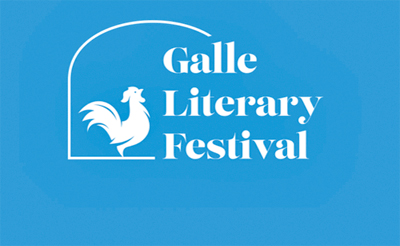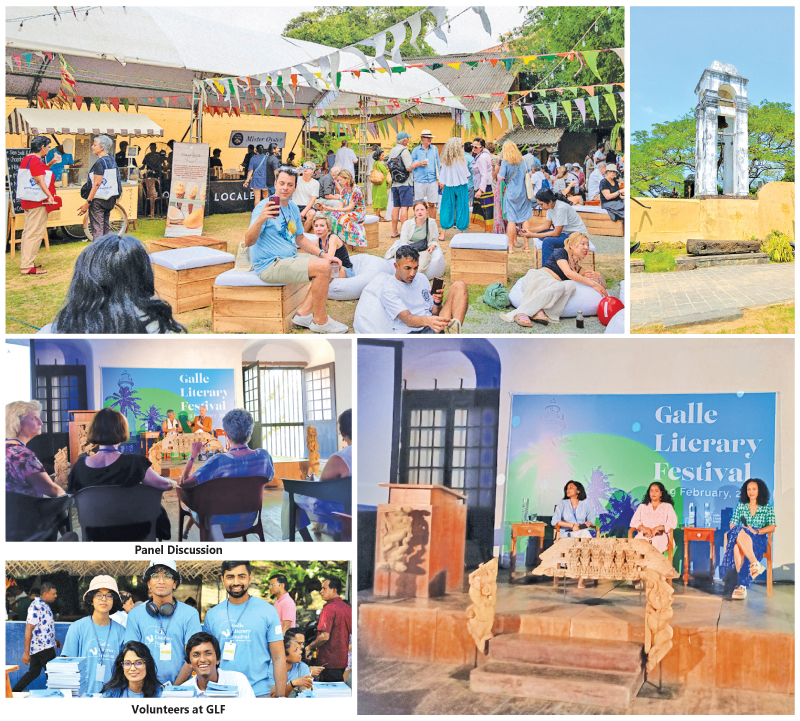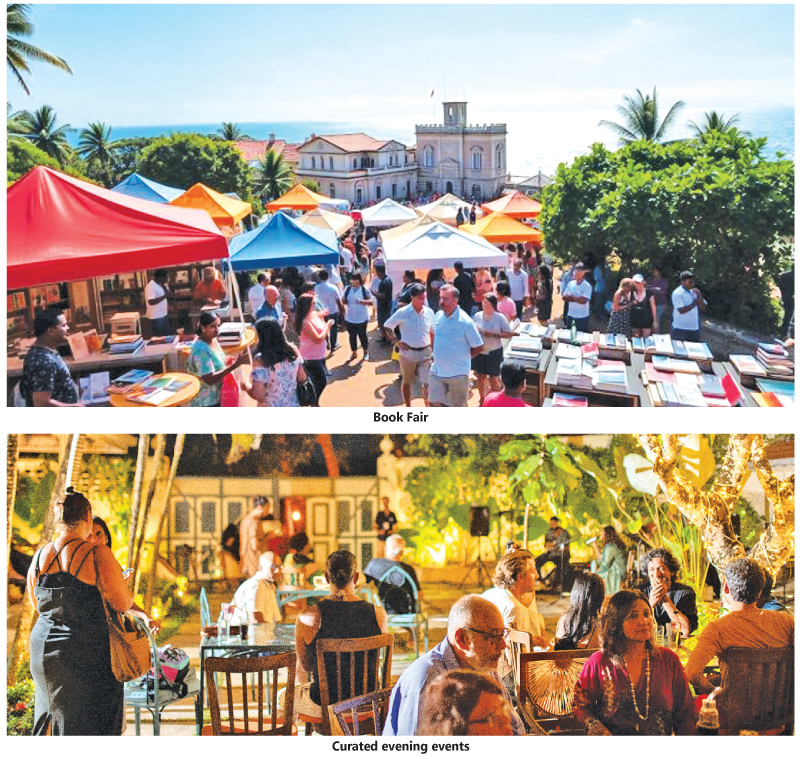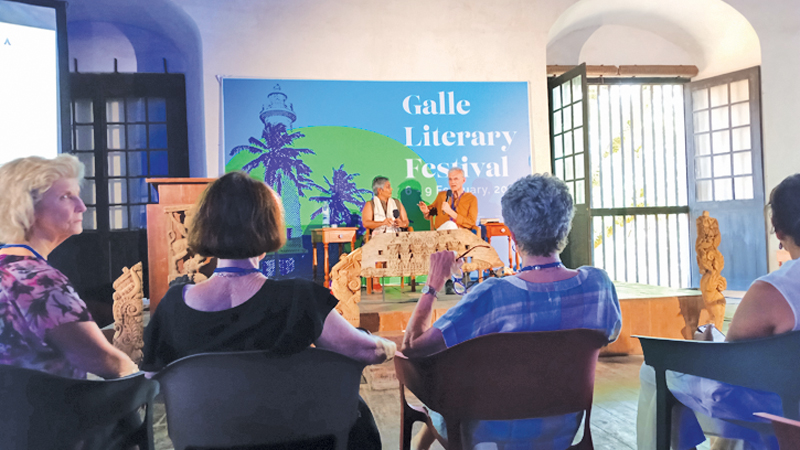 Galle Fort brims with a special vitality; it is that time of the year again where literary aficionados from far and wide gather amidst the colonial ramparts to celebrate all aspects, literary and otherwise. The inception of the Festival dates back to 2005 and was an initiative of Geoffrey Dobbs an Anglo- Australian hotelier, who conceived to promote local English Literature, Sri Lankan culture, the arts and the hospitality sector while focusing on the rich literary heritage of the region and beyond. The Galle Literary Festival took root once again for the 12th time from 6-9 February 2025.
Galle Fort brims with a special vitality; it is that time of the year again where literary aficionados from far and wide gather amidst the colonial ramparts to celebrate all aspects, literary and otherwise. The inception of the Festival dates back to 2005 and was an initiative of Geoffrey Dobbs an Anglo- Australian hotelier, who conceived to promote local English Literature, Sri Lankan culture, the arts and the hospitality sector while focusing on the rich literary heritage of the region and beyond. The Galle Literary Festival took root once again for the 12th time from 6-9 February 2025.
The day also held a special significance for cricket fans; just next door the Aussies were taking on the Lankan lions for the coveted Warne – Muralitharan trophy, an exhilarating mix of book lovers and cricket enthusiasts thronged to the Galle Fort to create a lively atmosphere of which the excitement was palpable. Volunteers in blue shirts were showing people around the locations and providing ample support to navigate the locations and the tagged participants and visitors were rushing eagerly checking their phones and leaflets to make it to the talks of their favourite authors.
Landscape of a Lost Kingdom
 Events were taking place throughout multiple locations in the Galle Fort and the Maritime museum was our focus for the day. First in the lineup of events was a conversation titled ‘Landscape of a Lost Kingdom’ with Sunela Jayewardena the author of Ravana’s Lanka, moderated by British –English writer Razeen Sally. A retired environmental architect by profession, Sunela tackles the quasi mythical landscape of our homeland in her book where she delves into the origins of Ravana and his rule of Lanka before the advent of Buddhism. The fiction invites audiences to challenge conventional storylines and blends myth and reality to illuminate the legacy of King Ravana’s lost kingdom.
Events were taking place throughout multiple locations in the Galle Fort and the Maritime museum was our focus for the day. First in the lineup of events was a conversation titled ‘Landscape of a Lost Kingdom’ with Sunela Jayewardena the author of Ravana’s Lanka, moderated by British –English writer Razeen Sally. A retired environmental architect by profession, Sunela tackles the quasi mythical landscape of our homeland in her book where she delves into the origins of Ravana and his rule of Lanka before the advent of Buddhism. The fiction invites audiences to challenge conventional storylines and blends myth and reality to illuminate the legacy of King Ravana’s lost kingdom.
Sunela had always been fascinated with nature and elephants and used to spend many times trekking the mountainsides and would hear stories of the past and tales that fascinated her. That is when the idea of a lost civilisation came to her mind. Her approach to history strays far from the traditional lines and believes that history is written by victims, with the Buddhist tradition heavily influencing our historical records.
The conversation took an interesting turn to pre Vijayan history and the existence of super civilisation in Sri Lanka. Our irrigation is one factor which tells the tales of the ancient super civilisation, yoda wewa for example holds certain dimensions which remain unable to be replicated to this day. While the line of Lanka from Adams Peak is so precise that only airborne technology could have made such daring calculations. The Buddha’s visits were also touched upon and the likelihood of a pre-Vijayan Buddhism that may have existed within the island with the three visits of the Buddha. A type of rebranding of Buddhism takes place with the arrival of Arahath Mahinda, where a state sponsored Buddhism takes root in the land.
Music and Kairos
Up next was Jenny Erpenbeck, celebrated German author, whose 2024 novel ‘Kairos’ became the first German novel to win the International Booker Prize. ‘Kairos’, a compelling novel that delves into the hardships of a relationship set against the backdrop of a crumbling East Germany is a story that centres on Katerina, a 19-year-old student and Hans, a 53-year old married writer who meet on a bus and fall in love. Their intense love affair unfolds in 1986 East Berlin, a time in history marked by political upheaval and personal transformation. The novel intricately examines the themes of power, art and culture, portraying the self-absorption of the lovers and their descent into a destructive vortex, all while reflecting the larger history of East Germany during this period. The conversation titled ‘Beyond Kairos’ touched upon opera, literature and language.
Music has markedly impacted the novelist and its influence on the writer and this came in conversation. “I had taken piano lessons from the age of seven and when I was 14, I entered a choir and was singing all the beautiful works of Bach. It seemed like perhaps I was turning to music; I then studied music at a conservatory in Berlin and passed the entrance examination and started to study opera. It seems to be a bit strange perhaps, but as it turned out it was an interesting profession”, she said.
Jenny loved opera and found it therapeutic and completely different to writing. In her novel she uses silence between dialogues to invoke a sense of unspoken rhythm into the conversations between the two main protagonists. It is indeed difficult to bring music to any written page, but Jenny does it ever so beautifully in the love scenes between Hans and Katerina where a requiem is played out just so we know the relationship is a doomed one from its very beginning. For Jenny, music envelops the pages of her books, from poignant love scenes to the death of Hans; the background music that is woven into words translates deeper meaning into the mind’s eye of the reader by this classically trained author.
Reclaiming ancestral traditions
After two intriguing conversations on books the next segment takes on an interesting approach with a panel discussion on Tattoos and reclaiming ancestral traditions from post colonial societies. Afua Hirsch , a British- Ghanian author in her book, Decolonising My Body: A Radical Exploration of Rituals and Beauty, talks about carving out body identity in line with cultural roots with the use of tattoos. Afua is someone who had spent a lot of her adult life thinking about colonialism, race and identity, diaspora, migration and globalisation, all of these structures that exist in the world and she believes that evidence showed the access to land and resources had varied unequally. By the time she turned 40 she realised she wasn’t applying these same ideas to her own body.
“I just had this moment where I realised that I found it problematic to mark your body in a way that celebrates your heritage, your ancestral belonging and your traditional knowledge systems that really connects you to the earth and your people. But I thought it was completely fine to have a potentially life-threatening procedure to artificially manipulate your appearance. The dissonance of that really reached me and I realised that I had a very colonised way of thinking”, she said.
Thus the journey she depicts in her book becomes more personal when she decided to get her tattoo. It was a very intentional break from that made her want to reconnect with what had been lost to her family and culture.











